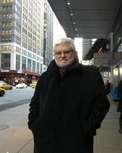 Chris
McDonnell, UK
Chris
McDonnell, UKchris@mcdonnell83.freeserve.co.uk
 Chris
McDonnell, UK
Chris
McDonnell, UK
chris@mcdonnell83.freeserve.co.uk
Previous articles by Chris Comments
welcome here
June
6, 2017
It’s time to sing again

It’s
often been called the four-hymn sandwich, one at the beginning of Mass,
one for the Offertory, one for Communion time and one at the end to send
us all home. A neat package of wordage that may or may not have been
planned with care, but it is what we have come to expect, words with a
difference.
It
has passed into folk-lore that Catholics don’t sing much and when they
do, the quality isn’t great. Certainly my childhood experience was one
of silent listening at Mass with hymns associated mostly with Benediction.
That has changed and we now have hymnals with words for all occasions.
When liturgy is arranged carefully, then the value we attach to words and
their appropriateness cannot be overlooked.
Why
is it that each of us has favourite hymns, words and tunes that mean
something to us? Very often it is through association with something where
the words were significant then and carry that significance with the
passing years. One friend kindly gave me a list of nearly twenty hymns
that have personal meaning for her.
I
remember one morning during school assembly we sang that tender and gentle
hymn ‘I watch the sunrise’, only to have a member of staff in tears
at the end for it had recently been sung at her mother’s funeral. Who
wrote the words or the music isn’t known. The final verse concludes an
eloquent story of a day and a life.
I
watch the moonlight guarding the night,
waiting till morning comes.
The air is silent, earth is at rest
Only your peace is near me.
Yes, you are always close to me
Following all my ways.
May I be always close to you
Following all your ways, Lord.
It
is an example of simplicity of language associated with a fine, easily
remembered tune, nothing flowery yet a firm expression of faith.
In
wine we offer you our spirit's grief’.
He
continues to tell that story and finally concludes with the reality of our
humanity.
‘Take
all that daily toil, plants in our heart’s poor soil,
Take all we start and spoil, each hopeful dream.
The chances we have missed, the graces we resist,
Lord, in thy Eucharist, take and redeem’.
Kevin
Nichols died some eleven year ago, in the Spring of 2006. His obituary in
the Guardian opened with these words.
’Monsignor
Kevin Nichols was the acknowledged wordsmith of his diocese of Hexham and
I
first came across Kevin in the early 60s when he spent a year
with student-teachers at Strawberry Hill prior to going to a post as head
of English at the newly-opened Christ’s College in
During
the 60s and 70s a new genre of hymn became popular and gave rise to the
phrase ‘Folk Mass’. The hymns reflected the music of the times, often
with guitar accompaniment. They brought liturgical singing to a new
generation, with some of them such as ‘Go
tell everyone’ still in use today. That tradition grew and
matured and gave rise in recent years to the beautiful lyrics and music of
the late Mike Stanley. Many of us are indebted to his talent that has
nurtured our liturgical experience. Sadly it was brought to early close. His
fourth anniversary was marked on Tuesday of this week, June 6th.
The
Iona Community in
Christ’s
is the world in which we move;
Christ’s
are the folk we’re summoned to love;
Christ’s
is the voice which calls us to care,
and
Christ is the one who meets us here
A
hymn, written with sincerity and depth of meaning, will continue to speak
to us and for us if it has integrity. Each one of us has a small gathering
of hymns that we treasure, whose words and music invoke otherness and a
deep sense of mystery. The words of Newman’s Lead
kindly light still point the way in difficult times.
----------------------